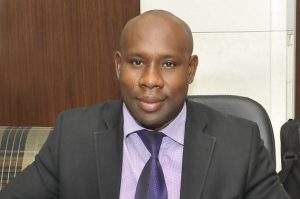Africa’s largest oil producer – Nigeria, relies on incomes from volumes of oil and gas mined from her different oil fields in the coastal Niger Delta region to sustain its economy, but again her oil industry is increasingly looking threatened by the climate change phenomenon. To make the impacts of this to the national economy a lot clear, Prof. Chukwumerije Okereke, who leads the Governing Inclusive Green Growth in Africa (GIGGA), a research think-tank funded by the United Kingdom Research Council to help Nigeria and three other African countries transit smoothly to green economy, spoke to journalists including OGN in a two-part interview on the side-lines of GIGGA’s recent meeting in Abuja. Excerpts.
It would be nice to meet you and the entity you represent.
Ok. I’m Chukwumerije Okereke, a professor in environment and development at the Department of Geography and Environmental Science at the University of Reading. I’m equally a senior fellow at the Oxford University Centre for the Environment, in the UK, as well as the Associate Director of the Leverhulme Doctorate scholarship programme on climate justice at the University of Reading.
Before joining Reading, I was the head of the Centre for Climate and Development at the Smith School of Enterprise and Development at the University of Oxford. My speciality is in the area of the interlink between environment and development with special emphasis on climate change governance, as well as the governance of energy globally.
OK, you led a team of green growth aficionados to Nigeria recently, what have you come to do?
The government of the UK recently made a call for research proposals that will help address major 21st century global challenges, and they titled it the ‘Global Challenges Research Fund’. As part of response to that call, I put a proposal to explore the dynamics of the governance of green economy in Africa.
I suggested to the UK Research Council that understanding the dynamics of the governance of the green economy in general and particularly the governance of inclusive green economy is a major challenge facing Africa and the world. My proposal was one of the 22 that were accepted for funding by the UK government under the Global Challenges Research Fund, and what my project seeks to do is to form a multidisciplinary and international network of academics; practitioners; think tanks; NGOs, governments and entrepreneurs, to come together to deliberate and come up with research agenda that can move our understanding of the development of green economy growth in Africa forward.
We had a workshop meeting in Ethiopia in March of the Governing Inclusive Green Growth in Africa (GIGGA) network, and the second leg of the GIGGA network was what happened in Abuja, continuing with meeting and brainstorming with stakeholders, and also undertaking a number of rapid response research to really get a grasp of the core issues and investment options for governing effective inclusive green growth in Africa.
Nigeria, which you chose as one of your focus is reeling in chronic energy scarcity. Have you found any new reasons for this?
I should have clarified that the GIGGA network is simply interested in understanding the dynamics and investment options, and how Africa as a whole can move forward in the area of governing green growth, and there are three focus countries – Ethiopia, which has made tremendous advancement in the governance of green economy; Kenya, because it is also a leader in green economy and growth in Africa; and Nigeria, because it is the biggest economy in Africa and has made some steps in green economy governance.
However, Nigeria’s challenges are multifocal and the key paradox is that it is too poor to be rich and too rich to be poor. It is endowed with enormous natural resources especially oil and gas, but the bulk of these resources are exported in a low value form with very little value addition.
We now have a situation where the future of crude oil is no longer certain and there are multiple forces that are acting on this – we now have climate change which is a development challenge for the entire globe, and an international agreement that is seeking to curtail the amount of CO2 emission from companies and countries, and that means oil is now being seriously regulated.
In addition to that, we now also have a revolution occurring in the world where a number of countries are investing in renewables and the US now profiting from fracking of gas, to mean that the cost of our oil is going down. In response to climate change, many countries are taking actions to encourage renewable energy.
Secondly, Nigeria actually has an abundance of renewable energy resources and so it is entirely possible to close the huge energy gap we have now. There is massive energy gap and one of the problems for that is that it costs a lot to generate electricity from oil sources, and the idea of a green economy offers Nigeria the opportunity to close this massive energy gap through solar and wind.
On the one hand, we see this development that is knocking oil prices, but on the other hand we have the renewable energy resources that can drive our economic development, and so, I proposed that really understanding how we can spur the renewable energy revolution is one of the fundamental things that any government that needs to move forward should adopt, but this isn’t happening unfortunately.
“…there is the dynamics that if we don’t shift to renewable energy, oil prices could fall to a point that it is unable to support the economy.”
You talked about an uncertain future for crude oil because of climate change, how deep is this for Nigeria?
Well, there are two key forces here – climate change impacts and desertification, but especially through flooding and sea level rise and vast proportion of the oil installation we have in the Niger Delta region can be affected by climate change.
If you remember, we had a devastating flood in 2011 and I think a lot of the installations were affected, and so one dimension is the climate change impact which is bound to affect oil facilities. The second is the fact that other countries are moving ahead to develop renewables, and that leaves us with a question of who will buy our oil.
Nigeria is very vulnerable to climate change, most of the oil installations we have in the coastal regions are vulnerable to climate change impacts. Less than one metre rise of the sea level stands to wipe the entirety of Lagos and about 40 metres from the coast into the hinterland which covers a lot of Delta; Warri; Port Harcourt and others. There is the possibility that we can lose a vast amount of our oil installations and so Nigeria should be at the forefront of driving the conversation in climate change and green economy.
Today, China is the world’s fastest developer of wind turbine; Germany has on its own indicated its interest to go completely green and set a moratorium on nuclear energy. Even Saudi Arabia and other Gulf countries, which are major oil producers are developing renewables. If you must know, a vast proportion of the Abu Dhabi city is on renewable, and so there is the dynamics that if we don’t shift to renewable energy, oil prices could fall to a point that it is unable to support the economy.





